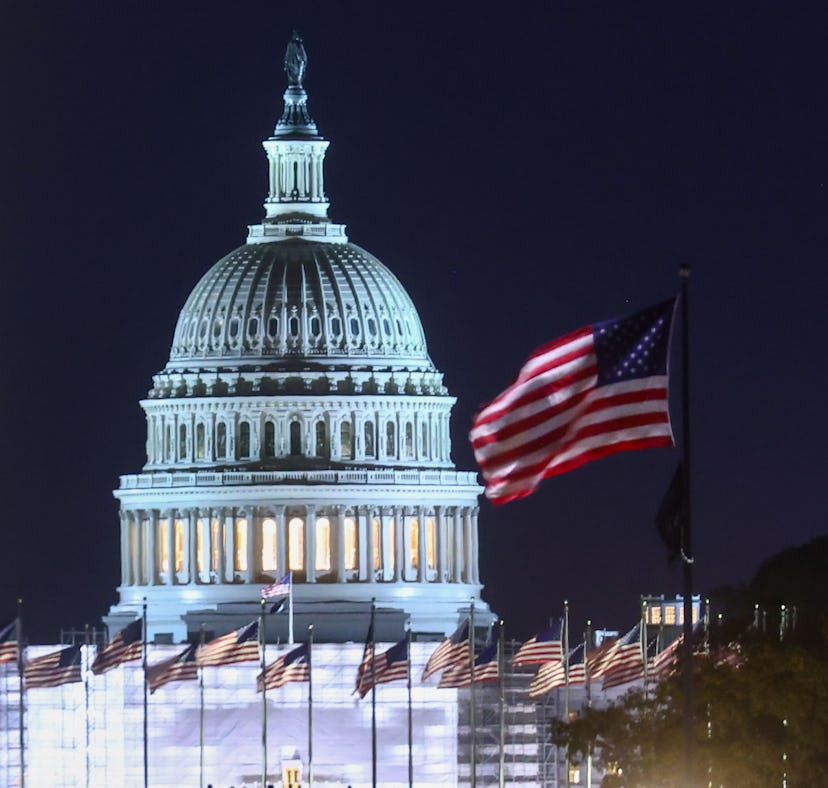
The Democrats Still Control Senate After A Nail-Biting 2022 Midterms
It was a really close race.
The 2022 midterm elections have come and gone, but the lasting effect they will have on the country is just getting started. After a long few days of “too close to call” nail-biters, voters finally learned exactly how their decisions affected our government. Here’s how the results for races like Warnock vs. Walker in Georgia, and Landsman vs. Chabot in Ohio will shape the Senate and the House for the next two years.
You might be flashing back to 2020, when it took over two weeks to call congressional races in some battleground states like Georgia. In the end, Democrats were able to take control of the House and the Senate that year. This was a pretty big deal considering the party that controls Congress tends to have the upper hand in creating and passing legislation, but even with majority rule, the 2022 midterms were anything but certain. Thankfully, the results of this election were finalized a lot sooner this time around, and once again, the Democrats were able to just barely retain control of the Senate. (Although the ballot-counting process can be a drag, I was happy to see Steve Kornacki and his beloved electoral map on my TV again).
Who Will Control The Senate After The 2022 Elections?
With 50 seats needed to earn the majority, Republicans only needed to flip one seat to gain control of the Senate. In the end, Democrats were able to keep their 50 seats, with Nevada incumbent Catherine Cortez Masto sealing the deal by winning her state’s contentious election on Saturday, Nov. 12. With Cortez Masto’s win, the Democratic party will serve as the majority party in the Senate until the next midterm election.
Prior to the midterms, Politico’s Senior Campaigns and Elections Editor and Chief Polling Analyst Steve Shepard predicted that Cortez Masto would face a “tough race” against Republican Adam Laxalt. True enough, Nevada’s race was one of the closest in the country, and one of the last elections to be called.
The open-seat Senate race everyone had their eye on took place in Pennsylvania between Democrat John Fetterman and Republican Dr. Mehmet Oz. Shepard reported that Oz needed to close the deficit between him and Fetterman on Nov. 4, just one day after Oz’s former colleague Oprah Winfrey endorsed Fetterman during the OWN Your Vote virtual conversation event on Nov. 3. It looks like the Oprah stamp of approval cemented his opponent’s lead, because the Associated Press called the race in favor of Fetterman the day after the Nov. 8 elections.
After the state flipped from red to blue during the 2020 election, all eyes were on the Georgia Senate race this go around. The race remained a close call between Democratic Sen. Raphael Warnock and Republican Hershel Walker, and in the end, CNN projected the battle for senator would be carried out a Dec. 6 runoff race. Though Democrats already secured control of the Senate, the Georgia runoff is still critical for the party, as analysts have pointed out that there are a few Democratic Senators who don’t always vote along party lines.
Who Will Control The House After The 2022 Elections?
Leading up to Nov. 8, Shepard predicted California’s 27th District, Iowa’s 3rd District, and Texas’ 15th District were all favored to lean Republican, while the race for Ohio’s 1st District could fall Democrat. On Nov. 9, The New York Times reported that Republican Monica De La Cruz won the 15th District of Texas, and that Democrat Greg Landsman had clinched the winning seat against his Republican opponent Rep. Steve Chabot in Ohio’s 1st District.
While the Senate majority was called a few days after the midterms on Nov. 12, the results are still unclear for the House of Representatives. As of Nov. 13, the ballots are still being counted, but it’s looking like Republicans may take the majority 218 seats.
With the new senators and representatives picked out and ready to go, the current makeup of Congress has just about two months to wrap up its business and prepare to switch over. New members of Congress will be sworn in on Jan. 3, 2023.